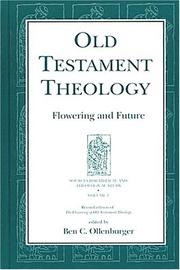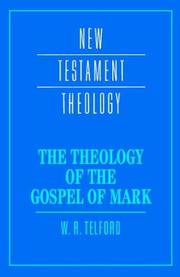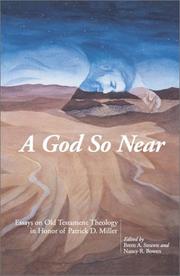| Listing 1 - 10 of 42 | << page >> |
Sort by
|
Periodical
ISSN: 19457596 01461079 Year: 1971 Publisher: [South Orange, NJ] : [London] : [Biblical Theology Bulletin] SAGE
Abstract | Keywords | Export | Availability | Bookmark
 Loading...
Loading...Choose an application
- Reference Manager
- EndNote
- RefWorks (Direct export to RefWorks)
Bijbelse theologie. --- Bible --- Bible. --- Biblical Studies.
Book
ISBN: 1621895173 9781621895176 1620327104 9781620327104 Year: 2013 Publisher: Eugene, Oregon : Wipf & Stock,
Abstract | Keywords | Export | Availability | Bookmark
 Loading...
Loading...Choose an application
- Reference Manager
- EndNote
- RefWorks (Direct export to RefWorks)
The End of the Unrepentant stands as the most thorough exegetical analysis of the biblical teachings about the fate of the unrepentant ever written. Following up the author's acclaimed monograph, After the Thousand Years: Resurrection and Judgment in Revelation 20, this study makes use of the nexus of the Isaiah Apocalypse (Isa 24-27) and Revelation 20 as a paradigm or interpretive lens through which to understand the teachings of the Psalms, the Prophets, Jesus, and the NT about resurrection, judgment, and the divergent futures of the faithful and the unrepentant.The question of whether hell is everlasting has been a topic of interest for many decades now among evangelicals, and the controversy has only intensified in recent years. Many Christians feel uneasy about the idea of everlasting torment, but their belief in the authority of Scripture leaves them feeling that this doctrine is inescapable. The End of the Unrepentant is written for them. It mounts a unique, positive exegetical argument for annihilationism--an argument so thoroughly founded on the prophetic words of Jesus, Isaiah, and John that it shifts the exegetical burden of proof to those who would wish, for theological reasons, to affirm everlasting torment.
Fire --- Chemistry --- Combustion --- Heat --- Biblical teaching. --- Bible --- Criticism, interpretation, etc. --- 22.08*3 --- 236 --- -Chemistry --- 22.08*3 Bijbelse theologie: themata --- Bijbelse theologie: themata --- Eschatologie. De novissimis --- Biblical teaching --- -Bijbelse theologie: themata --- -Biblical teaching
Book
ISBN: 9780300183733 0300183739 9780300181333 0300181337 9780300198836 0300198833 Year: 2013 Publisher: New Haven : Yale University Press,
Abstract | Keywords | Export | Availability | Bookmark
 Loading...
Loading...Choose an application
- Reference Manager
- EndNote
- RefWorks (Direct export to RefWorks)
It has long been acknowledged that Jews and Christians distinguished themselves through charity to the poor. Though ancient Greeks and Romans were also generous, they funded theaters and baths rather than poorhouses and orphanages. How might we explain this difference? In this significant reappraisal of charity in the biblical tradition, Gary Anderson argues that the poor constituted the privileged place where Jews and Christians met God. Though concerns for social justice were not unknown to early Jews and Christians, the poor achieved the importance they did primarily because they were thought to be "living altars," a place to make a sacrifice, a loan to God that he, as the ultimate guarantor, could be trusted to repay in turn. Contrary to the assertions of Reformation and modern critiques, belief in a heavenly treasury was not just about self-interest. Sifting through biblical and postbiblical texts, Anderson shows how charity affirms the goodness of the created order; the world was created through charity and therefore rewards it.
Charity --- 22.08*3 --- Alms and almsgiving --- Conduct of life --- 22.08*3 Bijbelse theologie: themata --- Bijbelse theologie: themata --- Biblical teaching --- Christianity. --- Christianity --- Religions --- Church history --- Biblical teaching.
Book
ISBN: 3110114747 3110846691 9783110846690 0899254594 9780899254593 9783110114744 Year: 1988 Volume: 174 Publisher: Berlin: de Gruyter,
Abstract | Keywords | Export | Availability | Bookmark
 Loading...
Loading...Choose an application
- Reference Manager
- EndNote
- RefWorks (Direct export to RefWorks)
The series Beihefte zur Zeitschrift für die alttestamentliche Wissenschaft (BZAW) covers all areas of research into the Old Testament, focusing on the Hebrew Bible, its early and later forms in Ancient Judaism, as well as its branching into many neighboring cultures of the Ancient Near East and the Greco-Roman world.
221.08 --- #GROL:SEMI-22.05 --- #GROL:SEMI-221<08> Beih 174 --- Oud Testament: bijbelse theologie --- 221.08 Oud Testament: bijbelse theologie --- Bible. O.T. Aramaic --- Theology --- Bible. --- Targum --- Theology. --- Targum. --- RELIGION / Biblical Criticism & Interpretation / Old Testament.
Book
ISBN: 1299463983 0300153783 9780300153781 9780300153774 0300153775 9781299463981 Year: 2010 Publisher: New Haven [Conn.] : Yale University Press,
Abstract | Keywords | Export | Availability | Bookmark
 Loading...
Loading...Choose an application
- Reference Manager
- EndNote
- RefWorks (Direct export to RefWorks)
If we look to the Bible for historical accounts of ancient life, we make a profound error. So contends Calum Carmichael in this original and incisive reading of some of the Hebrew Bible and New Testament's most famous narratives. Sifting through the imaginative layers of these texts with an uncanny sensitivity and a panoptic critical eye, he unearths patterns connecting disparate passages, providing fascinating insights into how ideas were expressed, received, and transformed in the ancient Near East. Ranging from Jacob's encounter with Leah to the marriage at Cana to Jesus' encounter with the woman at the well, these readings demonstrate the remarkable subtlety and sophistication of the biblical views on marriage, sexuality, fertility, impurity, creation, and love.
Sex --- Sex in the Bible. --- Biblical teaching. --- 22.08*3 --- 241.64 --- 241.64 Theologische ethiek: seksuele ethiek --- Theologische ethiek: seksuele ethiek --- 22.08*3 Bijbelse theologie: themata --- Bijbelse theologie: themata --- Biblical teaching
Periodical
ISSN: 01959085 18712207 Publisher: Pittsburgh
Abstract | Keywords | Export | Availability | Bookmark
 Loading...
Loading...Choose an application
- Reference Manager
- EndNote
- RefWorks (Direct export to RefWorks)
22 <05> --- Bijbel--Tijdschriften --- Periodicals --- Theology. --- Bijbelse theologie. --- Bible --- Bible. --- Theology --- Arts and Humanities --- Religion --- Christian theology --- Theology, Christian --- Christianity --- Théologie

ISBN: 1575060965 9781575060965 1575065541 Year: 2016 Volume: 1 Publisher: United States of America : [manufacturer not identified],
Abstract | Keywords | Export | Availability | Bookmark
 Loading...
Loading...Choose an application
- Reference Manager
- EndNote
- RefWorks (Direct export to RefWorks)
In this extensively revised and updated edition of The Flowering of Old Testament Theology, Professor Ollenburger provides help for beginning theological students, who are frequently overwhelmed by the proliferation of volumes dealing with Old Testament theology, to say nothing of the variety of approaches used in these works. This textbook has been re-issued with a new title, Old Testament Theology: Flowering and Future, and is now divided into five convenient sections-Part 1: The Background, Part 2: Old Testament Theology's Renaissance: Walther Eichrodt through Gerhard von Rad, Part 3: Expansion and Variety: Between Gerhard von Rad and Brevard Childs, Part 4: From Brevard Childs to a New Pluralism, and Part 5: Contexts, Perspectives, and Proposals.Selected essays include key theological statements of Otto Eissfeldt, Walther Eichrodt, Theodorus C. Vriezen, George E. Wright, Gerhard von Rad, Walther Zimmerli, John L. McKenzie, Ronald E. Clements, Walter C. Kaiser Jr., Samuel L. Terrien, Claus Westermann, Brevard S. Childs, Rolf Knierim, Horst D. Preuss, Walter Brueggemann, Paul R. House, Bernhard W. Anderson, Erhard S. Gerstenberger, Hartmut Gese, Phyllis Trible, Jon D. Levenson, John H. Sailhamer, Gunther H. Wittenberg, James Barr, R. W. L. Moberly, and Mark G. Brett.An appendix contains Johann P. Gabler's 1787 seminal essay on biblical theology. An extensive bibliography and indexes of authorities and Scripture references conclude the volume.
Bible. --- Theology. --- Criticism, interpretation, etc. --- History --- 221.08 --- 221.08 Oud Testament: bijbelse theologie --- Oud Testament: bijbelse theologie --- Antico Testamento --- Hebrew Bible --- Hebrew Scriptures --- Kitve-ḳodesh --- Miḳra --- Old Testament --- Palaia Diathēkē --- Pentateuch, Prophets, and Hagiographa --- Sean-Tiomna --- Stary Testament --- Tanakh --- Tawrāt --- Torah, Neviʼim, Ketuvim --- Torah, Neviʼim u-Khetuvim --- Velho Testamento

ISBN: 0521433665 0521439779 9780521439770 9780521433662 9781139163750 0511009348 9780511009341 0511009364 9780511009365 1139163752 051114900X 0511052634 Year: 1999 Volume: *1 Publisher: Cambridge Cambridge University Press
Abstract | Keywords | Export | Availability | Bookmark
 Loading...
Loading...Choose an application
- Reference Manager
- EndNote
- RefWorks (Direct export to RefWorks)
This 1999 book presents the reader with a comprehensive view of the theology underlying the first narrative account of the life of Jesus. In Chapter 1 Dr Telford introduces the background of the text and its general message, attempting briefly to place the Gospel (and therefore its theology) in its historical setting. In the second chapter, he describes and analyses the Gospel's theology, again from an historical perspective and with particular regard to its original context. In the third chapter, Telford goes on to examine the Gospel in relation to other relevant writings of the New Testament. Briefly reviewing this larger corpus and highlighting parallels and contrasts, where appropriate, he seeks to locate the Gospel's theology in its wider canonical context. The fourth and final chapter ranges even further afield, commenting on the Gospel's history of interpretation and on its significance in the contemporary context.
Bible --- Theology --- 225.08 --- 225.08 Nieuw Testament: bijbelse theologie--(algemeen) --- Nieuw Testament: bijbelse theologie--(algemeen) --- Bible. --- Marco (Book of the New Testament) --- Mark (Book of the New Testament) --- Markus (Book of the New Testament) --- Markusevangelium --- Vangelo di Marco --- Theology. --- Bible. N.T. Mark --- Book of Mark --- Arts and Humanities --- Religion

ISBN: 1575065363 9781575065366 1575060671 9781575060675 Year: 2004 Publisher: Warsaw : Eisenbrauns, Incorporated,
Abstract | Keywords | Export | Availability | Bookmark
 Loading...
Loading...Choose an application
- Reference Manager
- EndNote
- RefWorks (Direct export to RefWorks)
Annotation.
Miller, Patrick D. --- Bible. --- Antico Testamento --- Hebrew Bible --- Hebrew Scriptures --- Kitve-ḳodesh --- Miḳra --- Old Testament --- Palaia Diathēkē --- Pentateuch, Prophets, and Hagiographa --- Sean-Tiomna --- Stary Testament --- Tanakh --- Tawrāt --- Torah, Neviʼim, Ketuvim --- Torah, Neviʼim u-Khetuvim --- Velho Testamento --- Theology. --- 221.08 --- 221.08 Oud Testament: bijbelse theologie --- Oud Testament: bijbelse theologie --- HISTORY / Ancient / General. --- Bible --- Theology --- Miller, Patrick D. - Bibliography.
Book
ISBN: 1315711079 1322509743 1317490851 1845537343 9781315711072 9781317490838 9781317490845 9781845532895 9781845532901 1845532899 1845532902 1317490843 9781322509747 9781317490852 9781845537340 Year: 2009 Publisher: London ; Oakville, CT : Equinox Pub.,
Abstract | Keywords | Export | Availability | Bookmark
 Loading...
Loading...Choose an application
- Reference Manager
- EndNote
- RefWorks (Direct export to RefWorks)
The city is an ambiguous symbol in the Bible. The founder of the first city is the murderer, Cain. The city of Jerusalem is the place chosen by God, yet is also a place of wrong-doing and injustice. Jesus seems to have largely avoided cities except Jerusalem, where he was crucified. The City in Biblical Perspective examines the archaeological and social background of the urban biblical world and explores the implications of the deliberate ambiguities in the biblical text. The book aims to deepen our understanding of both the biblical and the contemporary city by asking how the Bible's complex understanding of the city can illuminate our own ever more urban time.
Cities and towns --- Biblical teaching. --- 22.08*3 --- 221.08*3 --- 221.08*3 Theologie van het Oude Testament: themata --- Theologie van het Oude Testament: themata --- 22.08*3 Bijbelse theologie: themata --- Bijbelse theologie: themata --- Biblical teaching --- Cities and towns - Biblical teaching.
| Listing 1 - 10 of 42 | << page >> |
Sort by
|

 Search
Search Feedback
Feedback About UniCat
About UniCat  Help
Help News
News